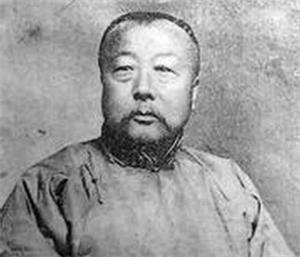(单词翻译:单击)
Ren Qingtai (1850 ~ 1932)
任庆泰(1850?1932)
Ren Qingtai, also known as Ren Jingfeng, was born in Faku County, Liaoning Province in 1850 and died of disease in Beijing 1932. He was the first Chinese filmmaker, so he was called the “Father of Chinese Film”.
庆泰,字景丰,又字觐风,1850年出生于辽宁省法库县,1932年病逝于北京。任庆泰是中国电影第一人,因此被称为“中国电影之父”。
Ren Qingtai went to Japan to learn photography when he was young and then launched the first photograph studio,“Fengtai Photo Studio” in Beijing, 1892. Although Ren Qingtai did not learnphotography in China, the motivation for him to learn the skill and to open his own photograph studio in China was drawn from the environment in north China where he grew up. Another factor was related to the development of Japan which became an e-conomical and military empire in the following two decades since the Meiji Reform began in 1874. Therefore, Ren Qingtai traveled to Japan to learn Western photography.
任庆泰青年时在日本学习过照相技术,1892年在北京开设第一家照相馆——丰泰照相 馆。尽管当时任庆泰在中国不是学照相的,但由于受他成长的中国北方环境的影 响下,他决定学习照相技术,在中国开设自己的照相馆。另一个原因与当时日本的发展有关。在1874年明治维新后的20多年里,日本成为经济和军事强国,因此, 任庆泰便到日本学习西方照相技术。
Around the beginning of the twentieth century, foreign films gathered in China attracted a great number of Chinese audiences. But only foreigners were entitled to show and make films then. With the rise of foreign film business from Italy, France and the USA, etc. which undoubtedly stimulated directly the first Chinese filmmaker very few Chinese people went to see the traditional Chinese “shadow play”(Ying Zi Xi). Ren's motivation to make films was related to make Chinese films which cater to the enjoyment of Chinese viewers. Another reason attributed to a commercial wave that was stimulated by the new medium of film which accelerated the birth of Chinese film.
20世纪初前后,汇集在中国的外国电影吸引了大批的中国观众,那时,放电影和拍摄电影也只是外国人的权利。毋庸置疑,来自意大利、法国和美国等外国电影 业的兴起直接刺激了中国第一位电影摄制者,而很少有中国观众去光顾中国传统的“影戏”。所以,任庆泰初拍中国电影是为了迎合中国观众的享受。另外一个原 因归于加速中国电影诞生的西方电影新事物刺激下的一股商业浪潮。
In 1905, Ren mounted a sheet against a wall outside his studio as a backdrop ,and filmed several excerpts from traditional Beijing Operas acted by famous Beijing Opera artist Tan Xinpei. Thus the first film, The Battle of Mount Dingjun, was successfully made in China.
1905年,庆泰在他照相馆外墙上裱出一片空白作为背景,拍摄了由著名京剧表演艺术家谭鑫培表演的原于传统京剧的几个片段。就这样,由中国人拍摄的第一部中国电影《定军山》成功地诞生了。

Following the success of the first film of Beijing Opera, Fengtai Studio continued to make seven films of Beijing Opera, including Chang Ban Po (1905), Green Rocky Mountain (Qing Shi Shan) (1906), Leopard (Jin Qian Bao) 1906, The Sunny Mansion ( Yan Yang Lou) 1906, White Water Shoal (Bai Shui Tan) (1907) , Capture Guan Sheng (Shou Guan Sheng) (1907) , Spinning Cotton (1908) , etc. These films were characterized by acrobatic fighting, dance movements and facial expressions.
随着第一部京剧电影的成功,丰泰照相馆又继续拍摄《长坂坡》(1905)、《青石山》(1906)、《金钱豹》(1906)、《艳阳楼》(1906)、《白水滩》(1907)、《收关胜》 (1907)和《纺棉花》(1908)等七部电影。这些电影都以武打格斗、戏曲舞步和面部表情为特点。
During this period, the filmmaker Ren Qingtai changed his department store into a cinema named Daguanlou Theatre which became the first Chinese cinema only showing films. The theatre promoted his film business to be more flourishing and prosperous. Fengtai Studio produced a total of eight films based on Beijing Opera from 1905 to 1909. All of them were made in Beijing and were warmly received by the public. The fad indicated that not only were Chinese films a success, but also that the aesthetic and cultural psychology of Chinese filmmaker and audience were in accordance with each other.
在此期间,电影导演任庆泰也把他的百货公司改建成了大观楼影戏园,后来成为仅放电影的第一个中国电影院。大观楼影戏园促使他的电影业蓬勃发展一片生机。1905至1909年间,丰泰照相馆共拍摄了八部京剧电影,所有电影均在北京拍摄并获得公众的热烈欢迎。事实表明,不但中国电影成功了,而且中国电影导演的审美和文化心理是符合中国观众的。
In 1909, a fire ruined Daguanlou Theatre and also ended all film activities of Ren Qingtai.
1909年,一场大火烧毁大观楼影戏园,同时也结束了任庆泰电影生涯的所有活动。


